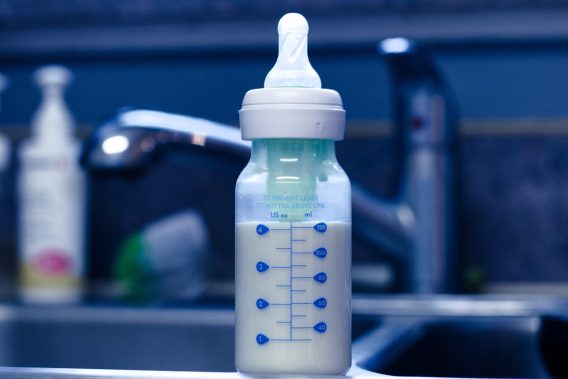FDA Gives Baby Formula Manufacturers New Guidance
Editors carefully fact-check all Drugwatch.com content for accuracy and quality.
Drugwatch.com has a stringent fact-checking process. It starts with our strict sourcing guidelines.
We only gather information from credible sources. This includes peer-reviewed medical journals, reputable media outlets, government reports, court records and interviews with qualified experts.

In the wake of multiple powdered infant formula recalls, the U.S. Food and Drug Administration has issued new guidance to help prevent deadly bacterial contamination.
Last month, the FDA penned a letter to all manufacturers, packers, distributors, exporters, importers and retailers of baby formula with a detailed strategy to eliminate future issues.
The guidance includes asking companies to:
- Comply with all regulations and quality control.
- Notify the agency if a formula is misbranded or contaminated after it has left the facility.
- Reevaluate production processes.
- Take any corrective action necessary.
- Voluntarily notify the FDA any time a product sample tests positive for Cronobacter or salmonella, even if the affected product hasn’t been distributed.
In early 2022 and late 2021, Cronobacter sakazakii bacteria and Salmonella Newport sickened infants. Two of those babies died.
Dangerous Cronobacter sakazakii bacteria is related to germs that can cause necrotizing enterocolitis and meningitis in infants. It is found in dry foods such as powdered infant formula, herbal teas, powdered milk and starches, according to the Centers for Disease Control and Prevention.
Recent bacterial contamination led to a massive baby formula recall and shut down a major manufacturing plant. That action led to a baby formula shortage last summer.
In its letter, the FDA also listed five ways manufacturers could improve production to lessen the risk of contamination:
- Control water in dry production areas.
- Verify the effectiveness of controls through environmental monitoring.
- Implement appropriate corrective actions following the isolation of a pathogen from an environmental sample or a product sample.
- Implement effective supply-chain controls for biological hazards.
- Identify all relevant biological hazards.
“FDA is sharing this information with you with the expectation that you will act to mitigate potential food safety risks in powdered infant formula in accordance with FDA regulations while further striving to improve operations, especially given the critical nature of these products,” the letter stated.
Critics Say FDA Must Act Faster
In late February, formula giant Reckitt issued a voluntary recall of 145,000 cans of Enfamil ProSobee Simply Plant-Based Infant Formula over the “possibility of cross-contamination with Cronobacter sakazakii.”
FDA inspectors had known about a positive Cronobacter test at Reckitt for months before the recall was issued, according to a Politico report. In September 2022, Reckitt’s internal testing found an undistributed batch of formula made at its Zeeland, Michigan, plant was positive for Cronobacter sakazakii. That batch was then destroyed.
According to the Politico report, the FDA later found that not enough cleaning had been done after the positive test. Two batches made after the contaminated batch were later recalled, five months after being distributed in the U.S., Guam and Puerto Rico. Critics say the FDA needs to act more swiftly after being notified of a positive result.
Mitzi Baum, CEO of STOP Foodborne Illness, a group that advocates on behalf of victims of outbreaks, told Politico the “FDA continues to be reactive. It’s the internal processes that have not been fixed, if this is happening again.”
Parents Sue Formula Makers Over Health Issues
In 2022, several baby formulas were recalled amid contamination concerns. Abbott Laboratories shuttered one of its major plants in Sturgis, Michigan, for months to undergo cleaning and upgrades.
That year nearly 100 baby formula lawsuits were filed against the manufacturers of Similac and Enfamil when premature babies developed necrotizing enterocolitis, or NEC, after consuming contaminated cow’s milk baby formulas produced by Mead Johnson and Abbott Laboratories.
Parents alleged that the two companies knew about the side effects but failed to warn consumers. Litigation is ongoing.


